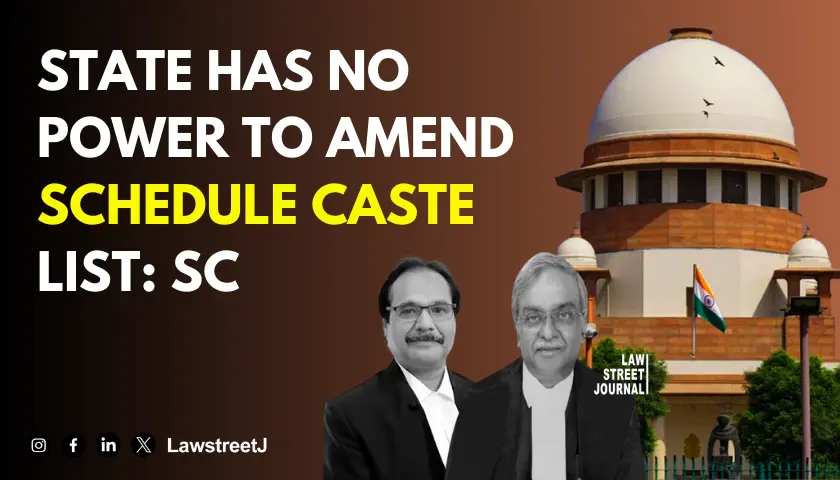NEW DELHI: The Supreme Court has said that a state government has no competence or authority or power to tinker with the lists of Scheduled Castes published under Article 341 of the Constitution.
A bench of Justices Vikram Nath and Prashant Kumar Mishra said, "Any inclusion or exclusion of any caste, race or tribe or part of or group within the castes, races or tribes has to be, by law made by the Parliament, and not by any other mode or manner."
The top court quashed a resolution of July 01, 2015 issued by the Bihar government stating that an extremely backward caste "Tanti-Tantwa” be merged in the Scheduled Castes list with the caste 'Pan/Sawasi'.
The court termed the state government's decision as "patently illegal, and erroneous".
"In the present case, the action of the State is found to be mala fide and de hors the constitutional provisions. The State cannot be pardoned for the mischief done by it. Depriving the members of the Scheduled Castes covered by the lists under Article 341 of the Constitution is a serious issue," the court said, using the strong words.
Citing Article 341 of the Constitution, the bench said from a plain reading of the Article and in particular sub-Clause 2, two things are clear – first, the list specified under the notification under Clause-1 can be amended, altered only by law made by Parliament.
Secondly, it prohibits that but for a law made by Parliament a notification issued under sub-Clause-1 cannot be varied by any subsequent notification, the court pointed out.
Also Read: Why selective public interest to probe encounters only in Gujarat, State govt to SC
The court also noted that the Article does not deal with merely castes, races or tribes but also parts of or groups within castes, races or tribes.
"Therefore, if any change is to be made with respect to inclusion or exclusion not only of any caste, race or tribe but also of a part of or group within any of the caste, race or tribe the same has to be done by law made by the Parliament," the bench said.
On appeals filed by Dr Bhim Rao Ambedkar Vichar Manch Bihar, Patna and Ashish Rajak, the apex court set aside the Patna High Court's order of April 3, 2017, which had dismissed the plea challenging validity of the 2015 notification.
The court said, "Any person not deserving and not covered by such list if extended such benefit for deliberate and mischievous reasons by the State, cannot take away the benefit of the members of the Scheduled Castes. Such appointments would under law on the findings recorded would be liable to be set aside."
The court directed the state government to return the SC quota posts on which appointments of Tanti-Tantwa community have been made and they should be reverted back to Extremely Backward Classes.
The Bihar government, on its part, sought to justify its action, contending the State has only acted on the recommendation of the State Commission for Extremely Backward Classes of February 02, 2015 and, as such, no fault can be found with the resolution of the State. It referred to socio historical factors and other statutory provisions considered by the Commission while making the recommendation.
The court, however, said the submission that resolution was only clarificatory is not worth considering for a moment and deserves outright rejection.
"The State knew very well that it had no authority and had accordingly forwarded its request to the Union of India in the year 2011. The said request was not accepted and returned for further comments or justification or review. Ignoring the same, the State proceeded to issue the Circular dated 01.07.2015," it said.
The court found the state government's act as "nothing short of mala fide exercise for whatever good, bad or indifferent reasons, the State may have thought at that moment".

















